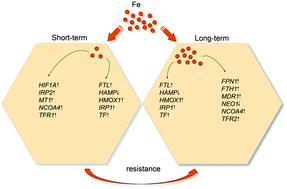当前位置:
X-MOL 学术
›
Metallomics
›
论文详情
Our official English website, www.x-mol.net, welcomes your feedback! (Note: you will need to create a separate account there.)
Compound-specific adaptation of hepatoma cell lines to toxic iron.
Metallomics ( IF 3.4 ) Pub Date : 2019-09-19 , DOI: 10.1039/c9mt00202b Sarah Guttmann 1 , Elisabeth Therese Dewald 1 , Cathrin Wohlfarth 1 , Jennifer-Christin Müller 2 , Uwe Karst 2 , Hartmut H Schmidt 1 , Andree Zibert 1
Metallomics ( IF 3.4 ) Pub Date : 2019-09-19 , DOI: 10.1039/c9mt00202b Sarah Guttmann 1 , Elisabeth Therese Dewald 1 , Cathrin Wohlfarth 1 , Jennifer-Christin Müller 2 , Uwe Karst 2 , Hartmut H Schmidt 1 , Andree Zibert 1
Affiliation

|
Cellular adaptation to excess iron (Fe) is a major determinant to protect tissues from toxicity. The adaptation of hepatoma cell lines following exposure to toxic levels of Fe compounds was studied. A dose- and time-dependent induction of toxicity was observed that was strictly compound-specific. Similar ranging orders of toxicity, i.e. iron chloride >iron sulfate >iron citrate, were observed in four human hepatoma cell lines. Long-term cultivation of HepG2 cells in 10 mM iron citrate resulted in a resistant cell line that displayed high proliferation rates for several months. Resistant cells showed increased viability at iron citrate concentrations ranging from 5–15 mM, while exposition to iron chloride or iron sulfate induced high rates of toxicity similar to parental cells. Resistance was not due to decreased Fe uptake/storage since high intracellular Fe levels were observed. A broad range of modulated gene expression was associated with short- and long-term iron citrate exposition; however, after weaning of resistant cells, re-exposition to Fe induced a similar level of toxicity as observed in parental cells suggesting that a transient adaptation of gene expression was mounted. The results indicate that, depending on the nature of the Fe compound, a specific level of toxicity is induced in hepatic cells which however can be overcome by establishment of resistance.
中文翻译:

肝癌细胞系对有毒铁的化合物特异性适应性。
细胞对过量铁(Fe)的适应性是保护组织免受毒性作用的主要决定因素。研究了暴露于有毒的铁化合物后肝癌细胞株的适应性。观察到剂量和时间依赖性的毒性诱导是严格的化合物特异性的。相似的毒性范围,即在四种人肝癌细胞系中观察到氯化铁>硫酸铁>柠檬酸铁。在10 mM柠檬酸铁中长期培养HepG2细胞会产生抗性细胞系,该细胞系在数月内显示出高增殖率。抗性细胞在5–15 mM的柠檬酸铁浓度下显示出增强的生存能力,而暴露于氯化铁或硫酸铁则引起高毒性,类似于亲代细胞。因为观察到高的细胞内铁水平,所以抗性不是由于减少的铁吸收/储存。广泛的调节基因表达与短期和长期柠檬酸铁暴露有关。但是,在抗性细胞断奶后,再次暴露于Fe诱导的毒性水平与亲代细胞中观察到的相似,表明基因表达的瞬时适应性增强。结果表明,取决于Fe化合物的性质,在肝细胞中诱导了特定水平的毒性,但是可以通过建立抗性来克服。
更新日期:2019-09-19
中文翻译:

肝癌细胞系对有毒铁的化合物特异性适应性。
细胞对过量铁(Fe)的适应性是保护组织免受毒性作用的主要决定因素。研究了暴露于有毒的铁化合物后肝癌细胞株的适应性。观察到剂量和时间依赖性的毒性诱导是严格的化合物特异性的。相似的毒性范围,即在四种人肝癌细胞系中观察到氯化铁>硫酸铁>柠檬酸铁。在10 mM柠檬酸铁中长期培养HepG2细胞会产生抗性细胞系,该细胞系在数月内显示出高增殖率。抗性细胞在5–15 mM的柠檬酸铁浓度下显示出增强的生存能力,而暴露于氯化铁或硫酸铁则引起高毒性,类似于亲代细胞。因为观察到高的细胞内铁水平,所以抗性不是由于减少的铁吸收/储存。广泛的调节基因表达与短期和长期柠檬酸铁暴露有关。但是,在抗性细胞断奶后,再次暴露于Fe诱导的毒性水平与亲代细胞中观察到的相似,表明基因表达的瞬时适应性增强。结果表明,取决于Fe化合物的性质,在肝细胞中诱导了特定水平的毒性,但是可以通过建立抗性来克服。



























 京公网安备 11010802027423号
京公网安备 11010802027423号